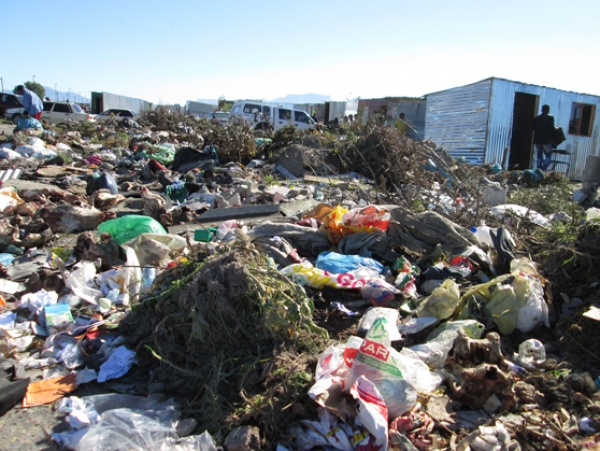From backyard to Rolihlahla Park

Nosiphiwo Lali built her shack in Rolihlahla Park in Philippi East three weeks ago. She is one of hundreds of people who have moved out of backyards into the Philippi area recently, in spite of the eviction of families in neighbouring Marikana settlement.
Lali and her friend were the first to build on the site.
“We built overnight and went to work the following day. When we returned to our structures and found they had not been demolished, we brought our belongings and started to stay,” says Lali.
Lali had been a backyard dweller since 1992. During that time her rent multiplied from R80 a month to R800 a month.
“The worst thing is that you are not only paying so much rent, you are made responsible for your landlord’s electricity usage,” says Lali.
Her shack is one of 69 that received an ERF number from Law Enforcement officials during a visit earlier this month.
“They told us we can stay for now but we are not guaranteed any safety from eviction.”
She and other residents have formed an interim committee to manage the settlement and to communicate with the authorities.
One of the things the committee does is advise newcomers about the area.
“We show them the area on the map and inform them about who the land belongs to.”
Newcomers are warned that the Marikana settlement is on land belonging to a private owner and that the site further away belongs to a supermarket.
Over the weekend scores of people were busy in the settlement, scouting for pieces of land on which to build, putting up their shacks or offloading their possessions.
Lali’s new home is built in a filthy environment close to a rubbish with carcasses of cattle heads piled up. There’s a smell of urine and faeces. But it’s better than living on someone else’s property, she says.
Carcasses of cattle heads pile up in the Rolihlahla Park settlement. Photo by Johnnie Isaacs.
“We have adapted to the conditions, we no longer smell anything.”
The community uses buckets and the bush as toilets.
In the backyard where she lived before, Lali says, she had access to the owner’s toilet in the house only when the owner or the children were at home. She also had to fetch water from inside the house.
Today she has to buy water from neighbours.
“We buy water from those who have access across the street for R30 per 20 litres. If you have no money you can’t bath and 20 litres is nothing,” said Lali.
But in spite of the lack of water or toilets, the smell, the rubbish, and the constant threat of eviction, Lali and others like her prefer Rolihlahla Park to their former backyard homes.

This article is licensed under a Creative Commons Attribution-NoDerivatives 4.0 International License.


